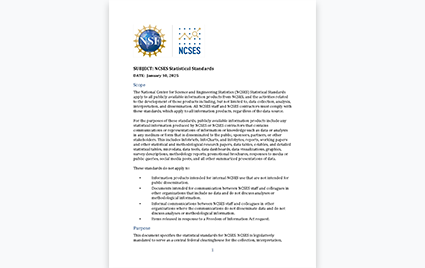
The National Center for Science and Engineering Statistics (NCSES) within the National Science Foundation (NSF) is committed to providing information that is objective and transparent, adhering to all directives and standards set forth by the Office of Management and Budget (OMB). As one of 13 principal federal statistical agencies, it is the function of NCSES to “collect, acquire, analyze, report, and disseminate statistical data related to the science and engineering enterprise in the United States and other nations that is relevant and useful to practitioners, researchers, policymakers, and the public.”
Commitment to Scientific Integrity
NCSES, along with our fellow Principal Statistical Agencies, has set a high standard of scientific integrity by embracing a common set of professional standards and operational practices designed to ensure the quality, integrity, and credibility of our statistical activities. Through this Statement of Commitment to Scientific Integrity (248 KB) , NCSES and other principal statistical agencies resolve to hold themselves to a high standard in safeguarding the scientific integrity of and ensuring the public's confidence in the statistical products we produce.
Commitment to Quality
There is a wide range of actions a statistical agency should undertake to ensure the quality of its products and practices. Furthermore, it is essential that statistical agencies strive to maintain credibility with those who use its data and information.
In its effort to serve as a trustworthy source of accurate and useful data derived in an objective and impartial manner, NCSES’s commitment to quality includes the following actions:
- Adhere to and implement OMB’s standards and guidelines
- Publish and implement formal quality standards including statistical standards for information products

NCSES Statistical Standards
View and download PDF
- Develop strong staff expertise in the subject areas relevant to the agency’s mission, in the theory and practice of statistics, and in data collection, processing, analysis, and dissemination techniques
- Maintain quality assurance programs to improve data quality and the processes of compiling, editing, documenting, analyzing, and disseminating data
- Keep abreast of and use modern statistical theory and sound statistical and computational practice in all technical work
- Develop an understanding of the validity and accuracy of the agency’s data and how to convey the resulting measures of quality (both uncertainty and bias) in comprehensible ways to users
- Document concepts, definitions, and data collection methods and possible sources of error in data releases to the public
- Develop and maintain relationships with appropriate professional organizations in statistics and relevant subject-matter areas
Information Quality Guidelines
- Maintain its commitment to using the best available science and statistical methods
- Subject information, models, and analytic results to independent peer review by qualified experts, when appropriate
- Disseminate its data and analytical products with a high degree of transparency about the data and methods to facilitate reproducibility by qualified third parties
- Ensure that the presentation of information is comprehensive, informative, and understandable
Each federal agency is responsible for issuing its own section 515 guidelines. As a result, NSF has developed corresponding information quality guidelines that can be reviewed in full in NSF’s Information Quality Guidelines.
 An official website of the United States government
An official website of the United States government

